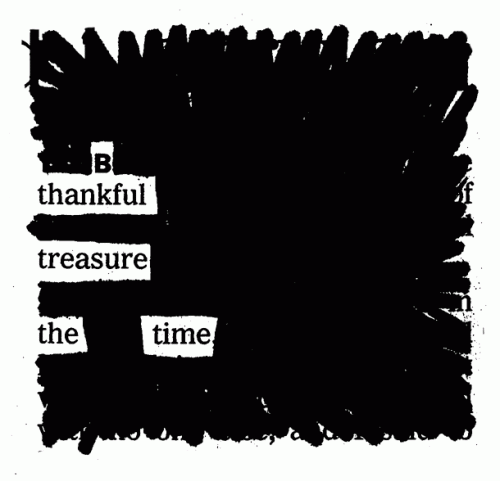Drew Myron's Blog, page 78
December 7, 2011
I Sing the Book Electric!*

We've come a long way baby! Book and blog — we've gone digital.
• Now you can enjoy Forecast in three wonderful ways:
Ebook - just $3.99
Softcover Book - $35
Hardcover Book - $48
About the Book
Using daily horoscopes as a launching point, writer Drew Myron tumbled and turned astrological prose into what she calls "horoscope poems," a form that — like a horoscope — directs and suggests.
Complementing the poems are 12 interpretive oil paintings by artist Tracy Weil. In a style that has been called "Dr. Seuss meets Van Gogh," Weil paints imagined landscapes where realism and surrealism meet in a colorful world both playful and profound.
Collaborating for over 20 years, Weil and Myron share an unusual approach to the creative process: They encourage 'accidents' to emerge. In this space of adventure and play, the duo blend forms to create inventive, accessible art. The result is a combination of chance and possibility, the zing of what is and what could be — in art and in everyday life.
What's your sign? Each of the works are sign specific. Which one speaks to you? A key is included in the back of the book.
• Also! Now you can read this blog on your Kindle.
Get it here: Off the Page - Kindle Edition
* as in:
- I Sing the Body Electric, a 1855 poem from Leaves of Grass by Walt Whitman
- A song from the film Fame (1980 film).
December 4, 2011
On Sunday: Less yourself
The poem is not the world.
It isn't even the first page of the world.
But the poem wants to flower, like a flower.
It knows that much.
It wants to open itself,
like the door of the temple,
so that you might step inside and be cooled and refreshed,
and less yourself than part of everything.
Yesterday, driving lonely roads, my want returned. As before, I wanted a spiritual experience.
Not church. Not saving. Not even epiphany.
But dramatic transformation.
So much of life is showing up. Listening. Being present. These are not small things. They sound small but they are not small. They are not even simple. In this dailyness, I know, is transformation.
But you can't see it. Not right away.
There are no harps or bugles or sweeping sounds. A lot of life is crickets.
And so, for many years, this urge arises: I want to awake with new eyes. I want to really see.
* * *
A friend and I roll our eyes at those who boast of being "called." We imagine lightening bolts and mock their certainty. We envy this sort of clear direction because we think most of life is figuring out the path as you are on it. This method of travel doesn't feel spiritual, determined or even accredited, but it is our way.
* * *
This week I found a book wedged within another. The Leaf and The Cloud by Mary Oliver. It's a thin book of just one poem. (Caveat: I am not an Oliver follower. I like the wildly popular Wild Geese most likely because it is unlike her usual nature-rich style).
But this thin volume has me entranced. The sentences are short, clear, and the sentiment reverent and reflective. Reading it, I am giver and receiver. I am hushed and expectant.
Would it be better to sit in silence?
To think everything, to feel everything, to say nothing?
This is the way of the orange gourd.
This is the habit of the rock in the river, over which
the water pours all night and all day.
But the nature of man is not the nature of silence.
Words are the thunders of the mind.
Words are the refinement of the flesh.
Words are the responses to the thousand curvaceous moments—
we just manage it —
sweet and electric, words flow from the brain
and out the gate of the mouth.
We make books of them, out of hesitations and grammar.
We are slow and choosy.
This is the world.
I copy these words, messy and quick, into my journal. I want to inscribe the tone onto my muscle, my memory, the mysterious place in the brain where words gather to mix with experience and reason and later rearrange into poem. I do not understand this place or process but I hope immersion will leave a residue.
* * *
Yesterday, traveling roads far from home, I loosened in the quiet. Tires on route. Rolling miles. The sun showed up, warmed the dashboard with light. The pale sky brightened, and I could see.
And I am thinking: maybe just looking and listening
is the real work.
Maybe the world, without us,
is the real poem.
November 30, 2011
Wish List
This season of giving is making me greedy. Shopping for gifts the other day I came home with a bag of goodies mostly for me.
It's probably a good thing my 2011 Wish List is short, and that it offers great gifts for readers & writers to both give and get:
 2012 Women Artists Datebook
2012 Women Artists Datebook
This handy 5x7-inch, spiral-bound, day planner offers 12 months of poetry and art by women writers and artists — and includes the poem, Why I Knit, by Marjorie Power of Corvallis, Oregon.
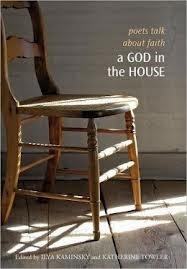 The Poets Laureate Anthology
The Poets Laureate Anthology
A collection of poems, gathered and edited by Elizabeth Hun Schmidt, from each of the 43 poets who have been named U.S. poet laureate since the post was established in 1937. The anthology includes introductions and work from Billy Collins, Rita Dove, Elizabeth Bishop, and more.
Bad Writing
A wry documentary from a self-declared "wannabe poet," featuring interviews with Margaret Atwood, Steve Almond, Nick Flynn, David Sedaris and more. Favorite line (from the trailer below): "There's no rule," says novelist Margaret Atwood, "that says you get steadily better."
What's on your Wish List?
What gifts are you giving? or hope to receive?
November 27, 2011
Last taste
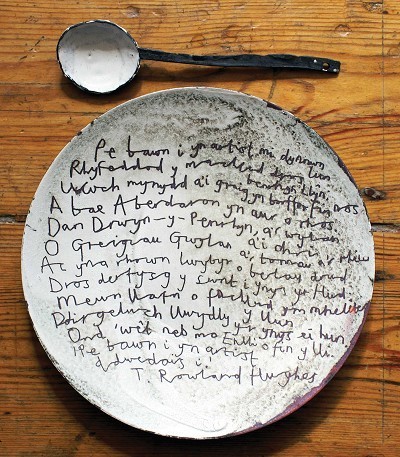 In the spirit of thanks giving, we've feasted on words all week.
In the spirit of thanks giving, we've feasted on words all week.
Thank you, readers and friends, for sharing your thankful-themed poems, prayers, paragraphs & praise.
Today, we wrap up the Feast of Words with poems from Gisele Vincent-Page and Jill Hardin.
It's the season of gratitude. Let us savor and share.
Time
Time, how lovely of you
to sit here with me.
The lake's edge of any entity
Water Rock Sand
All over the land.
Time amiss in bliss
Time for that, time for this
Time, time, time
Yesterday, today, tomorrow
Time, how lovely of you to sit.
— Gisele Vincent-Page
Gratitude Is
Gratitude is ... Gladitude!
Its Longitude and Latitude
expand greatly our Attitude …
Thus … adjusting to Wondrous
the ever changeable Altitude
at which
we find ourselves
Flying!
— Jill Hardin
November 25, 2011
After feast
 The Feast of Words continues. Today we move into the fullness of reflection. Like a good meal, gratitude fills and slows to show us all we have — and all we could lose.
The Feast of Words continues. Today we move into the fullness of reflection. Like a good meal, gratitude fills and slows to show us all we have — and all we could lose.
Today, poems from Rick Campbell and Ann Staley.
Rick Campbell, of Florida, is a poet, professor and the director of Anhinga Press:
Rainbow on Winding Creek
When the rain fell fat
drops splattered my head
and shirt like water ballons
falling from the sky. At the gate
the bluest rainbow arched
over the dirt road, beginning
and end, both touched earth.
I walked over in the name
of science to discover if a man
could pass through a rainbow
and come out the man he was.
No. When a man walks
through a rainbow he never returns.
He lives in Kansas, as if in witness
protection. His daughter, whom he left
on the porch waits and waits. The rain
stops. The sun sets. Darkness falls
and her Dad never comes home.
She gets cards postmarked from Tulsa,
Enid, Dumas, Dalhart, just pictures
of cattle, fences, long skies and thick clouds.
No words, but in the bottom
corner a crude fleur de lis.
She knows it's him. She wants to believe
he'll come back, that he didn't just
walk away in the rain. She loves him
but he's afraid that too faded
away when the light that fell through
clouds, shekinahs for believers,
shifted a few degrees west
and the rainbow was gone.
— Rick Campbell
Ann Staley, a poet and teacher living in Oregon, reminds us that the ordinary is quickly turned extraordinary:
Giving Thanks
We pulled out of our driveway at 2 p.m.
Taking a bottle of red and a chilled white, a baguette.
Humboldt Fog Blue and a Tumalo Farms Classico,
also a present for the hostess and a book of poetry.
We drove across the valley, about an hour to Sweet Home,
where a table was set for twenty-two plus
a couple of toddlers and a new baby named Desmond.
Folks had flown in from Chicago, Seattle and Redlands,
driven from Portland, Eugene, Corvallis,
a house full of guests, some staying for the week,
the weekend or overnight, with a fabulous breakfast
promised in the morning.
At 5 pm I was in the living room by the fireplace
telling my friend Ted about our Italy adventure,
all the details including the Opal we'd rented
in Zurich and driven 2000 km on Eye-talian
freeways and backroads, including up over the Alps
and down into Switzerland, a hair-raising event filled
with U-turns, backing up for buses filled with nuns and tourists.
I was drinking a glass of wine when Dave motioned me into
the kitchen and then to the bathroom just beyond
where Courtney was throwing up into the toilet,
had shed his wet trousers and boxers
and was stretched-out on the bathroom floor, a pillow under his head.
In his overnight case I found dry jeans, and then
we waited for the EMTs.
When they arrived his blood pressure was 36/50.
A few minutes later it had improved to 50/80,
and while the EMT's pressed about 12 little heart monitors
onto his chest, I began to wonder if I was going
to be phoning his mother and sister and brothers,
planning — you know — a funeral. Still, by the time the EMT's had finished,
Courtney's heart was beating at something akin to normal,
and he could take a few steps down the stairs
& lie down on the stretcher that went into the ambulance.
Two friends, Lisa and Lili, accompanied me as
we followed that ambulance about 15 miles to the nearest
Emergency Room where we ate some turkey and dressing
and pearl onions and waited for the E-Room's
Doctor Rose to appear on the scene.
After our holiday dinner, I went back to wait with CC.
He was lucid, smiling, and I chided him:
If you ever wet your pants in public again, I will have to divorce you.
We laughed. And began to think like normal people again.
No funeral. Just a ride home after the other tests and bloodwork.
I returned to the dinner, having missed all of it, to cheers
of happiness and thanks-giving. Courtney would live
to taste another turkey and to celebrate next time.
Now we're back home. Champagne and candle light.
With plans for breakfast and a walk along the Willamette,
gray and fulsome, trees dropping leaves,
snow expected on the mountain passes.
Whatever "Black Friday" is about, I could care less.
It was a dark Thursday night, and tomorrow
the sun will rise whether we see it or not.
— Ann Staley
Thanksgiving 2011
November 24, 2011
A Feast of Words for Thanks Giving
My husband pronounces today's holiday with an emphasis on the thanks, as in THANKS-giving. He does the same with UM-brella. Is this a Pittsburgh dialect? (as in redd-up? or yinz?) or just a Davidism? Either way, I am thankful for his natural emphasis on gratitude.
Let the feast continue! We've got a buffet, with word offerings from Candice Crossley, Ruth Harrison, Fred Strauss, and Paulann Petersen.
Reader Candice Crossley opens today's feast with wise words:
If the only prayer you ever say in your
entire life is "Thank you," it will be enough.
— Meister Eckhart
The following poem, by Ruth Harrison of Waldport, Oregon, is a pantoum first published in Harp Strings Poetry Journal.
Breaking Bread: a grace for mealtimes
Thank first the wheat, that lately stood alive
and amber, silvering in each change of wind.
Next: yeast, whose lively villages must thrive
to lift the dough to life of any kind.
Amber turned silver in the change of wind
--we feed on earth caught up through root and grain
expanding to lift life of any kind--
we feed on earth, and on her partner rain.
We feed on earth caught up through root and grain ...
Thank next: roots white and hot, transformed, and bless
dark soil that feeds us and its partner rain:
these lives join ours to rise in consciousness.
Thank now roots white and hot, transformed, and bless,
these leaves in green expression of the soil,
whose lives join ours to rise in consciousness
and feed our energy for daily toil.
These leaves give green expression to the soil.
Hardest and last, we thank you, gentle beast.
You daily feed our energy for toil;
your life subsumed in ours, in ours released.
Hardest and last, we thank you, gentle beast.
who never harmed us, yet whose life we take:
your life subsumed in ours, in ours expressed:
In joining our adventure, may you wake.
You never harmed us, all whose lives we take.
Thanks, yeast: your lively villages once thrived.
Conscious of shared adventure may you wake.
Thanks first to wheat, who lately stood alive.
— Ruth Harrison
Fred Strauss, a writer living in Tidewater, Oregon, shares a poem noting the pleasures (and pitfalls) of art, nature and good intention.
Basil Around the Easel
I set up an easel to paint all my sunsets,
escape my dumb sets, ignore many
subsets. But, out from our sky flew too
much goo. So there sits my easel
colored in plants, garden ants, scarecrow
pants. Never been used, badly abused
no hues have accrued. Accused of being
an ornament, a bangle, a jangle. Sadly,
it urges the ground around grow up make
this a harbor. Gladly to die for me and my
ardor. A frame takes the blame.
— Fred Strauss
We'll wrap up today's meal with a poem from Paulann Petersen, Oregon's Poet Laureate:
A Thanksgiving Grace
From us—here amid the blessing
of such good company—our gratitude.
For the bounty that draws us
around this laden table, our praise.
As we give our thanks, we celebrate
abundance: these fruits of the earth,
this bloom of family and friends
gathered here from nearby, from afar.
- Paulann Petersen
Our Feast of Words celebrates the power of gratitude through words. I am thankful, and grateful too, for friends, family, readers and writers who share these words with me, with you.
The Feast is not over! We've still got dessert. Keep those poems, paragraphs, prayers and praises coming. We'll be feasting all week. Send your word-works to dcm@drewmyron.
November 23, 2011
The feast begins
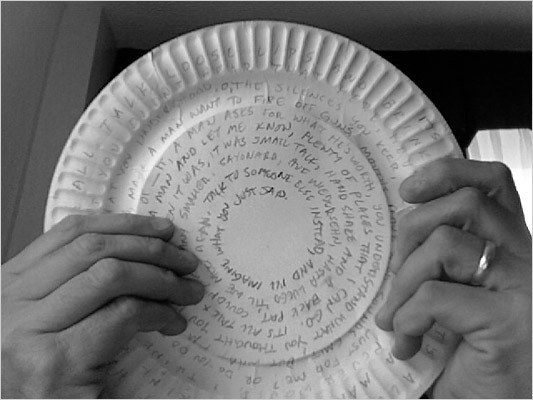 Peter Holsapple
Peter Holsapple
Welcome to the Thanks Giving Feast of Words.
When I called for thankful-themed writing, I had no idea the response would be so swift and full. I'm delighted with the offerings. We'll be feasting all week!
We'll start out with two pieces, from Ann Staley and Cathy Murphy.
To set a thankful tone, poet and teacher Ann Staley, from Corvallis, Oregon, shares an Inuit Song:
And I thought over again
My small adventures
As with a shore-wind I drifted out
In my kayak
And thought I was in danger,
My fears
Those small ones
That I thought so big
For all the vital things
I had to get and to reach
And yet, there is only
One great thing,
The only thing:
To live to see in huts and on journeys
The great day that dawns,
And the light that fills the world.
Our next piece comes from Cathy Murphy, a teacher living in Sacramento, California.
Gifted
Gifts given, over a two-week span, to a first grade teacher for her birthday
Golden gumball machine rings
A sparkly silver pencil (sans eraser)
Half a Pop Tart
Bits of red string
A broken plastic Easter egg
Coloring book pages, some blank, some not, some addressed to former best friends
Misspelled notes and pencil drawings
Shiny beads, hair bands
A single white frosted animal cracker wrapped in a used paper napkin
Two Skittles, half an eraser
A note enclosed in a partial envelope wrapped in torn paper and tied with cassette tape
Plastic gemstones, a friendship bracelet
Playground pebbles with flecks of shiny granite
A penny, a ruler, a caterpillar
Books with torn pages and crayon scribbles
A still-warm slice of sweet potato pie
Two inches of pale blue ribbon with three navy blue stars
An old stuffed rabbit with one button eye and no tail
A fuzzy green Lifesaver, a broken purple crayon
Two princess dominoes, a grocery store gift card
A plastic flower, a silk flower
Four purple and two pink roses from Gaby's backyard
Part of a homemade burrito, teeth marks on one end, beans oozing out the other
A dried out green marker
Three strings of Mardi gras beads
A plastic refrigerator magnet, maroon, capital Q
Quarter-inch diamond-shaped pieces of mirrored plastic
A used white eraser with the initials AM
Two sheets of car stickers
A song
Salvaged fuzzy-backed princess stickers
A plastic flower bead, a carrot
Three tangerines, four apples, a bruised pear
The embossed flower cut off the top left corner of a check
And a deck of 49 playing cards
— Cathy Murphy
Would you like to share? Please send your poems, paragraphs, prayers and praises by email to dcm@drewmyron.com. In this feast of words, more is merry.
A feast of words! A potluck of poems!
In the spirit of thanks giving, let's feast!
I've set the table and I'm ready to eat. Please share with me your poems, prayers, paragraphs & praise.
Send me your words — small starts, lines of hope, your stories, your flash, your fiction, your long list or one true thing.
I'll collect and gather, and post your works here. Got a blog or a book? Send a link, and pass the potatoes.
To take part, simply post your thankful-themed word-works in the comment section below, or email me at dcm@drewmyron.com.
It's the season of gratitude. Let us savor and share.
November 18, 2011
Thankful Thursday: Young Poets
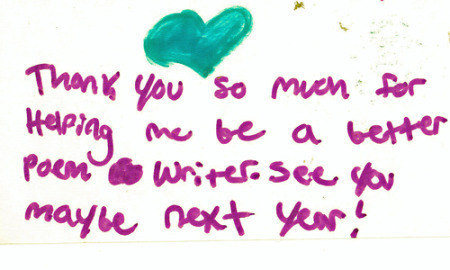
I spent the week at Seashore Family Literacy. On this Thankful Thursday, I am thankful for young readers and writers who fill me and stretch me, and write sweet notes.
It's Thankful Thursday! Gratitude. Appreciation. Praise. Please join me in a weekly pause to appreciate the people, places & things that bring joy. What are you thankful for today?
November 12, 2011
Fast Five with Oregon Poetic Voices
 In a world that really
In a world that really
doesn't seem to value
the small, quiet voice,
I think they felt like
they mattered
says Doug Erickson, as he finishes a day recording people and poems in rural Oregon.
Oregon Poetic Voices, founded by Erickson in 2009, is the nation's largest online poetry repository, offering a comprehensive digital archive of poetry readings from all over the state.
OPV contains recordings of almost every significant Oregon poet — including a 1921 recording of Oregon's first poet laureate — and over 300 contemporary poets of all ages, backgrounds and accomplishment. Access to the wesbite is free, and participation is open to all.
"We hope to be as inclusive as possible," he says. "Early on I thought it was important that this not to be a juried project. I felt that to really capture the essence of Oregon and its poets, it was important to leave it completely open to all. It gives the site a mixture of literary, cultural, and anthropological layers."
Though not a poet, Erickson — who works as special collections archivist at Lewis & Clark College in Portland, Oregon — carries an enthusiasm for the written and spoken word. As a result, OPV is growing fast. He travels town to town, across the state, inviting new, established, and self-described poets to share their words.
"I have had people come on horseback and on bus, from homeless people to the wealthiest of our state," he says. "Each with a story, and a medium to share their thoughts, ideas, and creativity."
 Doug Erickson, Oregon Poetic VoicesYou are not a poet, yet you appreciate poetry, and think it worthy to archive. Why did you create Oregon Poetic Voices?
Doug Erickson, Oregon Poetic VoicesYou are not a poet, yet you appreciate poetry, and think it worthy to archive. Why did you create Oregon Poetic Voices?
I do not self identify as a poet, but I am a writer, and know the highs and low of trying to communicate through printed words. Early on I thought it was important for me to not be a poet, and for this not to be a juried project. Much of the academic world that I live in is peer reviewed and scholarly. While I am a big believer in this type of scholarship, I felt that to really capture the essence of Oregon and its poets, it was important to leave it completely open to all. This has enabled the site to grow much faster that it would have been if every poem and poet was vetted. It also gives the site a mixture of literary, cultural, and anthropological layer to it. I imagine that not only those interested in poetry, but also anthropology, sociology, history and literature, in the future will find this site useful. I hope it becomes a time capsule for the thoughts and ideas of many Oregonians from this time period.
When and how did you start OPV?
The idea comes out of the encouragement of William Stafford, who was my colleague and friend at Lewis & Clark, who wrote and encouraged writing every day. When his archives came to the college, and I saw the nearly 50,000 pages of correspondence, I realized that much of these letters were from fellow writers, those that were famous, and those that were just simply trying to write, or become writers.
His teaching philosophy was "no praise, no blame," meaning encourage people to continue to pursue and grow as writers and thinkers. Sometimes praise and blame can lead one down a path that takes away from that seeking. While I don't fully subscribe to that notion myself, I do think in the case of OPV, this approach is a good one. Sure, there are many bad poems, yet there are also some very good, if not great, ones. They all represent a place in time for a writer/poet. Some with bad poems will go on and write great ones, and vice/versa. So, I wanted to capture and create a medium where this could take place.
Oft times historians and archivists wait for the history to come to them, rather than go out and harvest the activity that is happening presently. History is full of examples of recording that survived over time, the ruling class, and the prevailing race. With technology, and hopefully more cultural compassion, we can harvest the history of people, regions, races, genders, and voices, hereto forgotten or destroyed. And we can do it in the season that it is being created. I hope this is what OPV is doing.
What do you hope listeners will experience?
I hope they encounter the breadth, and expanse of this collection. There are so many self-identified poets that really feel passionate about their writing, and words. I have had people come on horseback and by bus, from homeless people to the wealthiest of our state. Each with a story, and a medium, to share their thoughts, ideas, and creativity. I think that Oregon is unique in having so many poets, but I also think that if other states were to try this same project (and I hope they do!) they would find that many people would come forward to share their writings.
Here's an excerpt of an email I received. I share it with you because I think it captures the feelings that many have when they come together and are able to share their work. I just happen to be the person who brings the equipment. The real OPV is simply the poets, young old, good, bad, famous, and not famous. Each share equal footing here, and collectively make up the voice of Oregon:
. . . I'm the woman who was so emotional I insisted on hugging you and thanking you for letting our voices be heard. What you may not know but should, is that when my friends came out of the recording room their faces showed the joy of accomplishment. We sat around the table and our poetry tribe found a reason to be a community together because a community happens sometimes when you don't know it will and reading our work brought us together. Reticent, shy people bubbled over with talk. People who I'd had to nag and keep after dared to come and do something they truly feared but wanted to do so much and, because of you, they just did it. . . . In such a complex, difficult, unknowable place as this earth, this life, I love when something is so clearly GOOD, and Oregon Poetic Voices simply is.
How is OPV funded?
OPV started with an initial grant from the Library Service and Technology Act, a grant distributed to all 50 states and administered by the State Library. The money originates with the Institute of Museum and Library Services.
We only have funding through January 31, 2012. After that, well . . . we are working on it. We are not really in a position to take donations, unless some angel wants to come in and be a major funder. We are looking to small granting agencies to see if we can keep some of this program going after Feb. 2011. I am Head of Special Collections and Archives here at LC for the last 20+ years, so I will continue in that role, and hope to keep OPV alive in some small way if no money comes our way.
Bonus Question: Anything I didn't ask that you'd like to answer?
None of this would be possible without the hard work and dedication of my team at Lewis & Clark College: Melissa Dalton, poetry project fellow; past poetry project fellow, Tessa Idlewine; Jeremy Skinner and Paul Merchant, my colleagues in Special Collections and Archives; OPV's design team Jeremy McWilliams and Annelise Dehner, and student interns and assistants past and present, Rachel Sims, Chris Keady, Natalie Figuroa, Anna Fredrickson, Caitlin McCarthy, and Becca Dierschow; workshop leaders, and all the local folks in communities across Oregon who helped to organize and prepare for OPV, and for making us feel at home in your communities.
To learn more, and listen, to Oregon Poetic Voices, visit www.oregonpoeticvoices.org.


